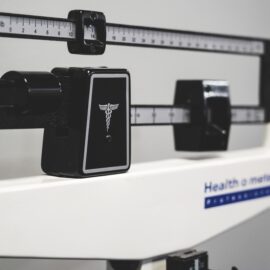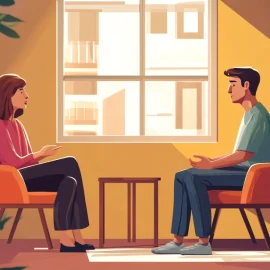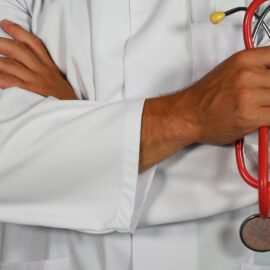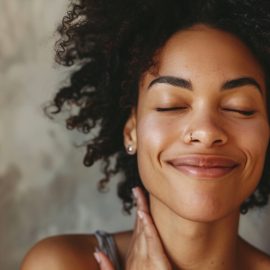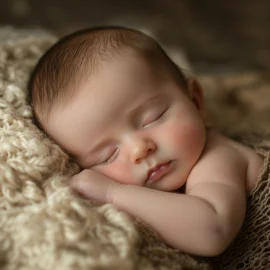
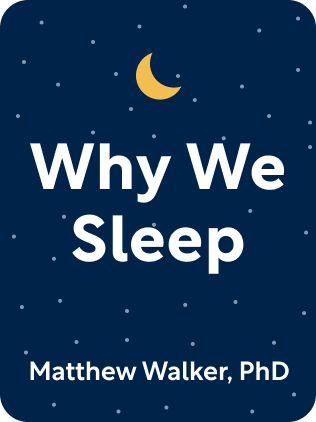
This article is an excerpt from the Shortform summary of "Why We Sleep" by Matthew Walker. Shortform has the world's best summaries of books you should be reading.
Like this article? Sign up for a free trial here .
Are you looking for ways to improve your sleep, and need a sleep hygiene checklist?
This sleep hygiene checklist can help you find ways to improve sleep that work for you. You may not use every item on your sleep hygiene checklist, but you can decide what works best.
Sleep Hygiene Checklist: Improving Sleep in Society
We’ve seen chronic sleep deprivation caused by a variety of factors, from the individual scaling up to the societal. If you have trouble sleeping, you can start with the following considerations for why you sleep poorly, before diving into your sleep checklist.
- Individual
- Automated “internet of things” household that can automatically sense your circadian rhythm and personalize the temperature and lighting to maximize sleep.
- Furthermore, if you have an upcoming disruption to your sleep schedule (like a flight), it can adjust your circadian rhythm to smoothen the transition.
- Sophisticated body trackers that record a host of factors — sleep, physical activity, light exposure, temperature, heart rate, mood, happiness, social performance, productivity — and shows how your sleep correlates with better performance on all dimensions
- Patients given tools to show their compliance with a program (like blood pressure monitors, scales) increase compliance rates. More data on sleep would improve sleep quality.
- Can also predict when it’s best to get a flu shot (since sleep affects responsiveness to vaccine)
- Cars that sense sleepy driving through facial recognition and driving behavior. The car can shut down in dangerous situations. Drivers with good sleep habits may get lower insurance rates.
- Automated “internet of things” household that can automatically sense your circadian rhythm and personalize the temperature and lighting to maximize sleep.
- Educational
- Have sleep be a mandatory subject in physical education (like drugs and diet)
- Have predictive tools that show the costs to health and income if you continue your poor sleep habits
- Instruct the populace on sleepy driving as much as drunk driving
- Organizational
- Companies should be more flexible about work hours, allow naps, and de-emphasize hours worked in favor of real productivity.
- Employers and insurance companies can incentivize sleep. For example, for a certain number of days of over 7 hours of sleep (as tracked by a sleep monitor), get extra vacation days, more pay, or reductions in health insurance premiums.
- Hospitals should promote sleep hygiene for patients, especially in the ICU and NICU. Change the harsh white lighting, dispense earplugs and eye masks, reduce alarms and beeps, and schedule lab tests to align better with sleep schedule.
- Better sleep is shown to reduce sensitivity to pain, and increase weight gain and O2 sat levels in neonates.
Nightly Sleep Hygiene Checklist
- Set a sleep schedule: sleep and wake up at the same times every day. Don’t sleep procrastinate, and don’t think that you can just sleep in on weekends (it makes it harder to wake up Monday morning)
- Don’t use alarms if you can help it. Alarms cause a huge stress reaction on waking. And snoozing causes repeated stress traumas every morning.
- Wake up with the sun or use very bright lights. This sets your circadian rhythm.
- Avoid all caffeine and nicotine if possible. But if you have to have caffeine, avoid it in the afternoon, since it takes over 10 hours to wear off fully.
- Exercise regularly, but not within 3 hours of sleep.
- Don’t nap after 3PM – they make it harder to sleep at night.
- Don’t drink alcohol unless it is completely metabolized by sleep time (including the aldehydes produced).
- Avoid large meals and drinks late at night. Large meals can cause indigestion; too many fluids cause frequent urinations.
- Reduce light before sleep. Blue light is the most harmful, but even bedside lamps cause issues. Artificial light delays the circadian rhythm by hours.
- Cool body temperature before sleep. The ideal sleeping temperature is 65F given standard bedding and clothes. Other tricks – expose your palms and feet while sleeping, take a hot bath before sleeping.
- Don’t rely on sleeping pills – these are usually just sedatives that put you more in a sedation state than sleep. Also, avoid medications that disrupt sleep.
- Don’t lie in bed trying to fall asleep for more than 20 minutes. Get up and do something until you feel sleepy. Anxiety will make it harder to fall asleep.
Sleep Hygiene Checklist: Other Ways To Help You Sleep
Though it’s not on your sleep hygiene checklist, there are some other things that affect your quality to sleep. The following can interrupt sleep or stop you from falling asleep.
Caffeine
This was already discussed in chapter 2. The tips, for good measure:
- Caffeine is of course in coffee, some soft drinks, and some teas, but also chocolate.
- Be careful when drinking decaf, as it apparently contains 15-30% of caffeine in regular coffee – it’s nowhere near zero caffeine.
- If you must have it, don’t drink it in the afternoon, and definitely not in the hours before sleep.
Light
Light is a signal for the suprachiasmatic nucleus to regulate the circadian rhythm (by signaling to the pineal gland to secrete melatonin). In the natural world, when the sun goes down, there’s little light. But nowadays, artificial light bathes our homes and disrupts our circadian rhythm.
Any light is disruptive to the circadian rhythm. Electric light delays your 24-hour circadian rhythm by 2-3 hours each evening. Think about this when referencing your sleep hygiene checklist.
- Even 8-10 lux (a measure of light intensity) delays melatonin release. A bedside lamp is 20-80 lux, and a typical living room is 200 lux, suppressing melatonin by 50%. (In comparison, the full moon only provides about 0.1 lux.)
- Light can suppress melatonin for days after usage stops.
Blue light is most problematic, suppressing melatonin at twice the levels of warm light. Blue light is most emitted by digital screens like TVs, computer monitors, and smartphones.
- We respond most to blue light because we evolved from marine creatures, and blue light penetrates water best.
- Reading on an iPad vs a book causes 50% less melatonin secretion and delayed the rise by 3 hours.
Tips:
- Dim lights in the rooms where you spend evenings.
- Maintain complete darkness throughout the night, using blackout curtains.
- Use settings on your phone and computers to tint the screen orange, reducing blue light.
- Consider yellow-tinted glasses that block blue light.
Constant temperature
In natural environments, the temperature rises and falls with the day. This is used by the hypothalamus, along with light, to set the circadian rhythm. Our bodies react in kind — before sleep, the body cools, ejecting heat through densely perfused areas like hands, feet, and face. Checking the temperature should be on your sleep checklist.
But in modern days, we use thermostats to homogenize our temperatures, suppressing the highs in the day and raising the lows with pajamas and blankets. Our brain doesn’t get the same signal about the day’s cycle that it used to.
Cooling body temperatures improves sleep. In an experimental treatment, people wear a body suit that circulates cool water. Among insomniacs and the elderly, this reduces time to sleep and increases quality of NREM sleep.
Tips:
- The best temperature to sleep at with standard bedding and clothing is 65F, which is far lower than most people keep bedrooms.
- Try activities that help remove heat from the body:
- Hot bath before bed (expands capillaries, which after bath drops temperature)
- Splashing water on skin
- Sticking hands and feet outside blanket.
Alcohol
Alcohol is a sedative, causing what appears to be sleep but is really more like anesthesia. It disrupts sleep by suppressing REM sleep and causing waking throughout the night. This is caused by aldehydes from alcohol metabolism.
Alcoholics are so sleep-deprived that their brain imposes REM-like behavior during wakefulness — hallucinations, scattered thinking. (Shortform note: an unfortunate vicious cycle can result here — alcohol disrupts sleep, which causes more fatigue and less behavior control when awake, which prompts more alcohol.)
By disrupting REM sleep, alcohol disrupts the normal processes of learning and complex knowledge.
- In an experiment, subjects were tasked with learning a new grammar on day 1. When exposed to alcohol on the first night, they lost 50% of memory recall compared to the abstinent group. Surprisingly, those getting alcohol on night 3 lost 40% – damage can occur for memories days past.
Tips:
- The author encourages total abstinence from alcohol, as puritanical as that sounds. A drink takes hours to fully degrade and excrete, and it’s even worse for people with alcohol flush reactions.
Alarms
Setting an alarm may seem like something you want on your sleep checklist, but it’s actually the opposite. Alarms cause acute stress responses when you wake up, spiking cortisol, heart rate, and blood pressure. This is not good for you. Even worse, snoozing the alarm causes multiple stress responses in quick succession.
The best path to waking is natural, without alarms. Wake up at the same time of day everyday. If you have to, commit to waking up when you hear the alarm, to avoid snoozing.
“Life hacks” on how to defeat the snooze button are missing the point – rearrange your sleep so you wake up naturally.
A sleep hygiene checklist is a great way to make sure you’re following sleep best practices. You can use your sleep hygiene checklist in any way you want.

———End of Preview———
Like what you just read? Read the rest of the world's best summary of Matthew Walker's "Why We Sleep" at Shortform .
Here's what you'll find in our full Why We Sleep summary :
- Why you need way more sleep than you're currently getting
- How your brain rejuvenates itself during sleep, and why nothing can substitute for sleep
- The 11-item checklist to get more restful sleep today

